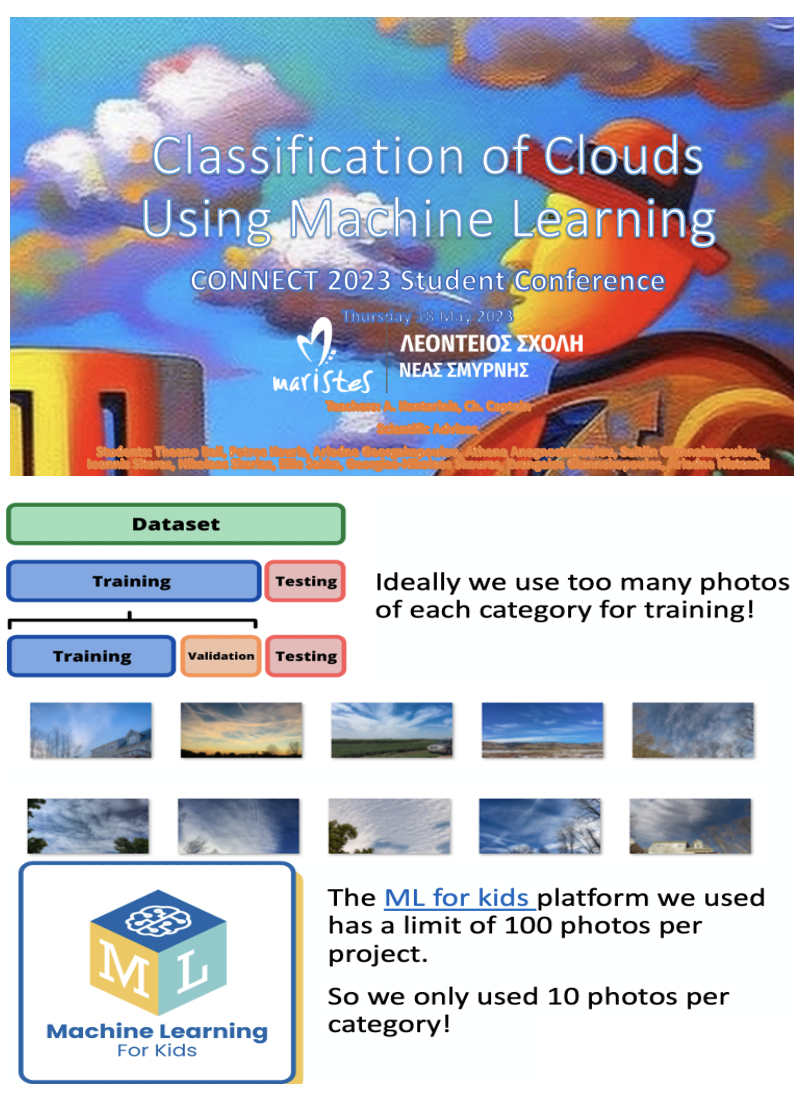News . Best Practices AI for Climate Action (SDG13)

This report presents an open schooling initiative on Artificial Intelligence for SDG 13 – Climate Action, which was developed by a group of students, their families, teacher and a scientific advisor, A. Kontarini; Ch. Captain; Students: Theano B., Petros K., Ariadne G., Athena A., Suitlin G., Ioannis S., Nikolaos S.,
Ellie S., Georgios N. S., Evangelos G., Ariadne N. in Crete – Greece, during the period in the school year 2023. It was supported by RDE, Crete using the CARE-KNOW-DO framework and CONNECT-Science Instrument (Okada, 2023) . This work was presented in the Final Student’s Conference in Heraklion and also at CICOS-2023 Conference in Barcelona.
Care:
Greece is dealing with some serious climate issues lately. Students are seeing more heatwaves, droughts, and wildfires, all made worse by climate change. The Mediterranean area, where Greece is, is especially at risk. During the summer of 2021, there were huge wildfires that destroyed forests, homes, and people’s lives. Students considered weather forecasting important for various reasons:
- Disaster Prep: Knowing the weather in advance helps us get ready for extreme events like heatwaves, storms, and wildfires, making them less deadly and damaging.
- Farming: Farmers need weather forecasts to decide when to plant, water, and harvest their crops.
- Public Safety: Forecasts help keep people safe by warning us about extreme temperatures and bad air quality.
- Tourism: Tourism is a big deal for Greece’s economy, and weather conditions can seriously affect it. Good forecasts can make sure tourists stay safe and have a great time.
Know: Students conducted a research project on meteorology, focusing on cloud classification and weather systems. They learned that Luke Howard introduced the three main cloud types—cumulus, stratus, and cirrus—in 1803, and in 1918, it was discovered that weather changes are caused by the interaction of warm and cold air masses.
Do: Using AI, the students classified clouds into 10 subcategories based on altitude. They trained a neural network with photos of different cloud types, testing its accuracy with new images. The project included developing a mobile app for cloud identification and correlating the AI predictions with data from their school’s weather station to forecast local weather
AI for SDG 13: Climate Action
Findings related to the Open Schooling approach: The activities carried out during the implementation of the Connect project were included in the upper secondary curriculum – Information Technologies (IT). We can also mention that the materials provided were useful in preparing and implementing lessons with students. The topic addressed was also relevant and innovative from a scientific and educational point of view, being debated globally. Thus, students had the opportunity to know and experience individually the ways in which they can get involved in predicting weather and support climate action enhanced by Artificial Technologies. Open schooling was found useful for other teachers because students focused on activities connecting various subjects supported by transdisciplinarity approach and an exchange of good practices can be made between teachers who have implemented in different schools who want to join us.
Student achievements: Students were enthusiastic to participate in volunteering and greening activities where they could observe, for example, classification of clouds, how to use drones, and develop a learning machine system trained to examine photos and classifying images. This process helping to plan better interventions for climate change and improve quality of life.
The students involved have formed their scientific research skills, actively participating in the realization of projects and studies on Artificial Intelligence, being able to apply the knowledge learned after going through the support materials coding and using ML for kids tool.